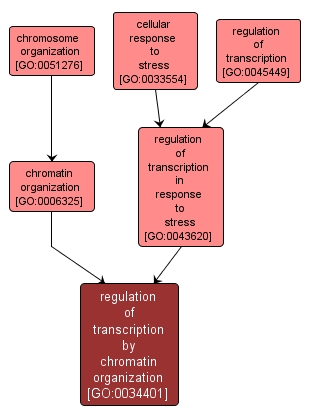GO TERM SUMMARY
|
| Name: |
regulation of transcription by chromatin organization |
| Acc: |
GO:0034401 |
| Aspect: |
Biological Process |
| Desc: |
Any cellular process that results in the specification, formation or maintenance of the physical structure of eukaryotic chromatin that modulates the rate, frequency or extent of DNA-dependent transcription. |
Synonyms:
- establishment or maintenance of chromatin architecture during transcription
|
|

|
INTERACTIVE GO GRAPH
|














